Let's find out what types of electrical tape are, and what is its actual scope.
Types of electrical tape
The Russian industry produces the following types of insulating tape:
- Cotton (HB). It is, in fact, a rubberized cotton-based adhesive tape; can be either unilateral or bilateral. It has sufficiently high heat-resistant qualities - it can be operated at temperatures over 100 °C.
- Polyvinyl chloride (PVC). It is a PVC film with an adhesive composition applied on one side (rubber or acrylic adhesive). Such electrical tape is not as heat-resistant as cotton, but at the same time it has an important quality - it is an excellent dielectric and has high elasticity. High-quality PVC electrical tape is able to withstand voltages over 4000 V.
To ensure high quality electrical insulation, experts advise winding electrical tape in several layers, approximately 2-3.
The above types of tape cannot be called a quality standard: they lose their properties when the humidity rises, they can “peel off” in the cold, they are poorly unwound from the roll, the glue “flows” - it remains on the fingers and the lower layers of the tape, etc. The industry does not stand still, and electrical tapes produced by well-known European companies have truly unique properties, which we will discuss in more detail.
3M ™ Insulating Tapes: The Benefits of a World Famous Brand
3M Electrical Tapes are high-quality PVC-based tapes that are resistant to abrasion, moisture, alkalis, acids and UV (only black tapes). Tapes have high dielectric properties, provide good mechanical protection at minimum quantity winding layers and meet the requirements international standards for PVC tapes (UL, CSA, VDE). ZM ™ insulating tapes are used for primary electrical insulation of connections and busbars for voltages up to 600 V, as well as for protection and wiring of cables and wires.
Insulating tape 3M™ Scotch Super is a PVC based product with the following features:
- High resistance to temperature extremes. Insulating tape 3M ™ does not lose its properties at temperatures from -40 to +105 ° C.
- Moisture resistance. Insulating tapes of this brand are not affected by moisture.
- Tolerance to mechanical stress and abrasion.
- Resistance to chemical agents: alkalis, acids.
- Highest elasticity and adhesion to various materials.
- Fire resistance (3M™ electrical tapes are self-extinguishing and do not support combustion).
- Excellent electrical insulating properties.
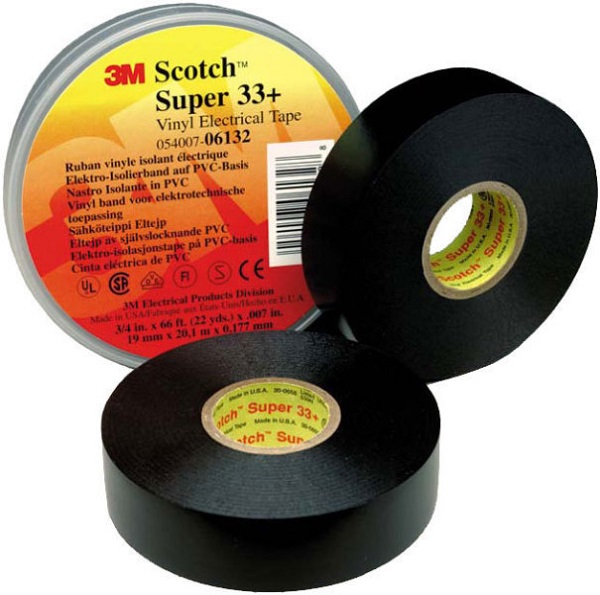
Let's understand the 3M ™ product portfolio:
1) Top class electrical tapes
Electrical Tape 3M™ Scotch® Super 33+ High quality tape for professional use. Suitable for mounting at low temperatures (down to -18°C). Retains properties at temperatures down to -40°C. It has excellent elasticity and high adhesion. Resistant to UV, chemicals, abrasion and weathering. Self-extinguishing, does not support combustion. Good dielectric properties.
3M™ Scotch® Super 88 Extra strong electrical tape for professional use. It has the same characteristics as Scotch® Super 33+ but has even higher tear strength.
3M™ Scotch® 22 Electrical Tape Heavy duty high quality insulation tape. It has the thickest and highest tensile strength of any other tape in its class, as well as increased wear resistance and mechanical strength. Retains its properties at temperatures from -10 to +90°C. Self-extinguishing, does not support combustion.
3M™ Scotch® 35 Electrical Tape Colored insulating tape for professional use. Resistant to discoloration, abrasion, chemicals and weathering. Self-extinguishing, does not support combustion. Colors: red, orange, yellow, green, brown, gray, blue, purple, white.
2) Middle grade electrical tape
3M™ Scotch® 780 Electrical Tape For a wide range of industrial applications. Has a good electrical strength, elasticity and mechanical protective properties. Suitable for temperature range from -10 to +90°C.
3) Economic class universal electrical tape
3M™ Temflex™ 1300 Electrical Tape Resistant to abrasion, solvents, weathering. Provides sufficient mechanical protection with a minimum number of winding layers. Colors: black, grey, brown, red, yellow, green, yellow-green, white, blue.
Scope of insulating tape
Insulating tape has found wide application in various industries both industrial and domestic. Previously, it was even used in sports: they wrapped hockey sticks to absorb shocks and extend the life of the sports equipment.
Professional area of use of electrical tape:
- Electrical insulation of splices of cables and wires of various voltages.
- Protective sheath for high and low voltage busbars.
- Repair and insulation of high voltage cables.
- Bundling of cables and wires.
- Color identification of power wires, electrical phases, piping systems, fencing of various zones with varying degrees of danger.
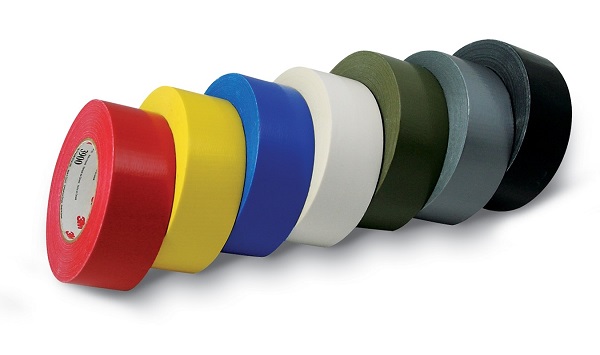
The standard thickness of the insulating tape is 13-20 mm, and the larger it is, the better the electrical insulation performance of the material. 3M ™ manufactures extra thick tapes (22 mm or more) used for insulating high voltage cables.
3M™ Special Tape
3M™ also produces a range of adhesive tapes with special properties for specific applications. These include:
- Mounting tape 3M ™;
- Metal tapes for shielding and grounding ЗМ ™;
- Anticorrosive and sealing tapes and mastics;
- Insulating tapes for fastening and harnessing;
- 3M™ Self Adhesive Rubber Bands
- 3M™ Heat Resistant Tapes
- Double-sided electrical tapes used for attaching metal parts to each other;
- Silicone tapes for high temperature applications.
It is not so easy to choose high-quality electrical tape, but the fire safety of any objects, including your home, ease of use and work often depends on the quality of these products.

How to save money on auto gluing
Many manufacturers of flexible packaging, when purchasing printing equipment, quite consciously complete it with a unit for automatic gluing of the printed material. All of them plan to reduce their costs of downtime and material loss when stopping and accelerating the press.
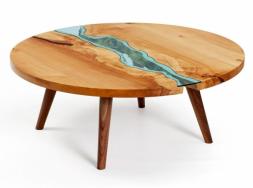
Methods for gluing wood to glass: an overview of methods and available materials
How to glue wood to glass? This question interests everyone who comes into contact with repair and design. The fact is that materials that are so different in structure require a special approach. What are the ways to connect them and what are the advantages of each of them, read here.

Label materials and marking of goods: types, requirements
What are the label materials and how to choose the right option - everyone who is associated with production and trade should learn about this.
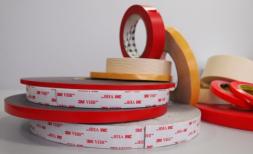
Die-cutting-converting material
Packing tape, adhesive tape and stretch film are not always the final product. With the help of special machines, they receive a different shape and size, and with them new application possibilities. For example, double-sided tape turns into furniture caps, and Dual lock into a Go Pro mount. This is the die-cutting-converting of the material.

Contact adhesives ZM - types and methods of application
3M contact adhesives are a real find for construction, repair, furniture production, and various decorative works. They dry quickly, adhere securely and are generally very easy to apply.
iso pvc tape is a demanded consumable, the most important purpose of which is to provide hermetic durable isolation of various objects and parts from certain factors environment.
What is electrical tape
PVC insulation tape has a standard spool shape with a width of approximately 14-19 mm. On one of its sides, a certain sticky coating of rubber and acrylic adhesive is applied. These substances are completely non-toxic, therefore they are completely harmless to humans. It should be noted that this material has good resistance to various kinds of temperature extremes. In addition, it has simply excellent extensibility. This quality, first of all, affects the winding itself and the impermeability during its application.
PVC electrical tape is a material made on the basis of polyvinyl chloride and designed to insulate wiring from such environmental factors as:
- Moisture;
- Sun rays;
- Solvents;
- Salt solutions.
In addition, it is used to isolate bare electrical wiring from accidental human contact with them or interaction with each other, which will prevent the likelihood of a short circuit. The most common are PVC-based tape and HB electrical tape.
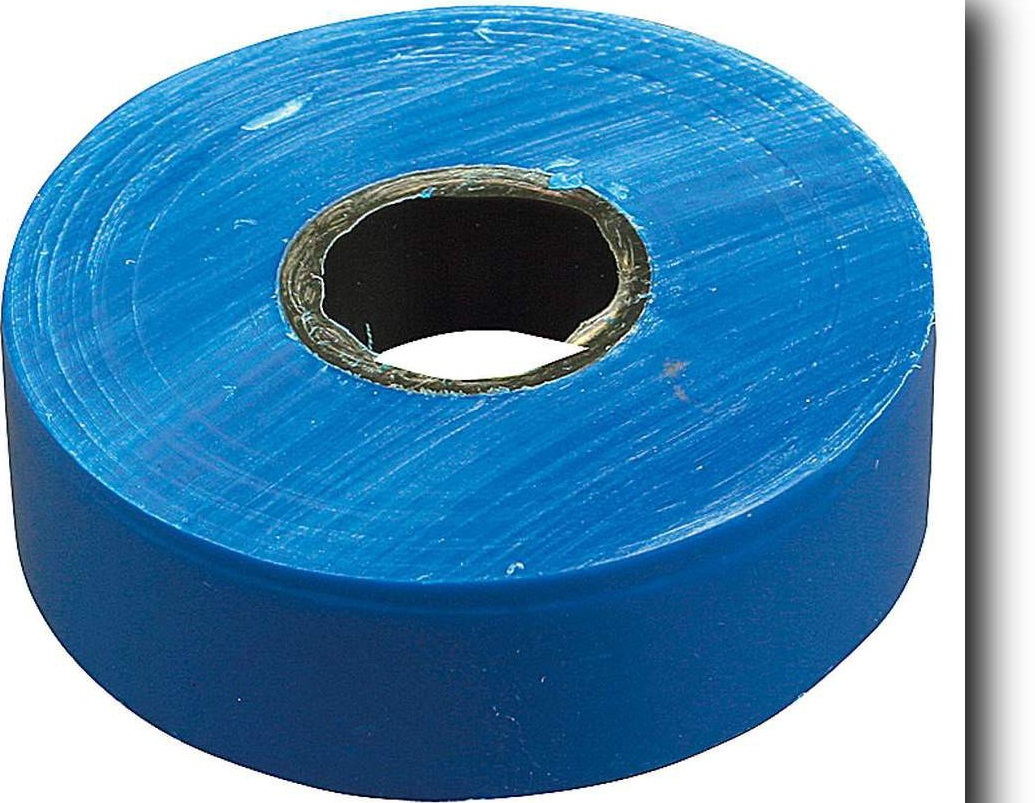
The electrical tape is designed to withstand voltages up to 5000 volts, which is quite enough for use in industrial and domestic work.
To preserve the qualities of the material, it is recommended to store the electrical tape in a dry, not aggressive environment. This material is very practical and easy to use, as it is perfectly wound, has good hermetic abilities, and does not get dirty.
Features of HB electrical tape
HB insulating tape is a very popular material that is widely used in domestic conditions.
This is cotton rubber band made from materials such as:
- Calico;
- Coarse calico;
- Shoe lining.
To ensure the most optimal storage conditions, the room temperature should be between 0 and 24 degrees. Relatively practical application This type of insulating tape has the advantage of being used in very hot places. Due to the fact that it is rubberized, it can be used in the same way as PVC. However, it is worth noting that it withstands a high melting point during firing, as a result of which, some qualities disappear from it, and completely different ones appear.
As a result, a hard and durable coating is formed in the winding area, which is able to protect bare areas from short circuits with conductive parts. Especially this quality is used in heating devices.
Insulating tape and its types
Insulating tape is one of the very useful materials used to insulate various objects and structures. This product has many varieties, each of which is used for different purposes and has its own specific qualities and characteristics.
Now widely produced Various types electrical tape, the main of which are considered:
- Bitumen-rubber;
- With a foil layer;
- Made of polyethylene foam;
- Polyvinyl chloride;
- Fiberglass.
Bitumen-rubber electrical tape is manufactured using a special technology using durable materials. It is used specifically on asphalt pavements. Such tapes may have a self-adhesive layer. With the help of such material, various seams are sealed, and cracks in sidewalks and roadways are also filled. It can be used to fill freshly laid asphalt or repair old pavement.
Insulating tape with a foil layer is needed for the manufacture of thermal insulation products, as well as for construction and repair work.

This product perfectly reflects the sun's rays and heat due to the presence of a foil layer. Polyethylene foam tape is characterized by the fact that vinyl is used for its manufacture, and it is widely used in various fields, in particular, in the installation of underfloor heating, furniture manufacturing, and printing. Vinyl electrical tape withstands various temperatures and is characterized by high strength. Important! Which insulating tape to choose depends largely on the characteristics of the work being done, as well as the characteristics of the material itself.
Characteristics of PVC tape
If you need to insulate wires, then it is best to use PVC electrical tape, as this is the best and most reliable option. It is widely used in everyday life and in production during electrical work to insulate wires. In addition, such material is required for mounting, fixing and fastening the package.
Such an insulating tape is made of polyvinyl chloride, with a resin-based adhesive layer applied to one side. It is cut into separate strips of a certain width and length. The tape is wound on a sleeve made of polymer of a certain diameter.
This product is characterized:
- High tensile strength;
- Relative elongation at break;
- Withstands various temperature ranges.
It comes in a variety of colors. It must be stored in indoors, at a certain distance from heating devices. It is forbidden to store it near organic solvents, chemicals, flammable liquids and many other aggressive agents. Subject to the required conditions of storage, packaging and transportation, the warranty period is significantly extended. Making insulation with it is quite simple, the most important thing is to follow all the rules for using this insulating material.
Properties and purpose: rag electrical tape
Despite the fact that it is now widely used to connect VAG electrical wires, however, many experienced electricians still use standard electrical tape familiar to everyone. The rag insulation tape is very good, reliable and of high quality, therefore, it can be used for various jobs.
Rag electrical tape has many different advantages, among which it is necessary to highlight such as:
- Does not melt when heated;
- Withstands high mechanical loads;
- Not damaged at low temperatures.
In addition, the electrical tape does not stretch when applied and can also withstand very high voltages. Such a product does not withstand moisture very well, which is why it is best to use it indoors for insulating wires. Also, electrical tape is well suited for the engine compartment in a car. By their own technical specifications, it is in no way inferior to automotive insulating tape, however, its cost is much lower. The application of electrical tape is very simple, just hold the reel and wind it around the wires or other product. Due to the wide variety of this product, you can choose absolutely any material in color and width.
black electrical tape
Black PVC electrical tape has long been considered a quality, reliable and time-tested material. It is widely used for electrical work.
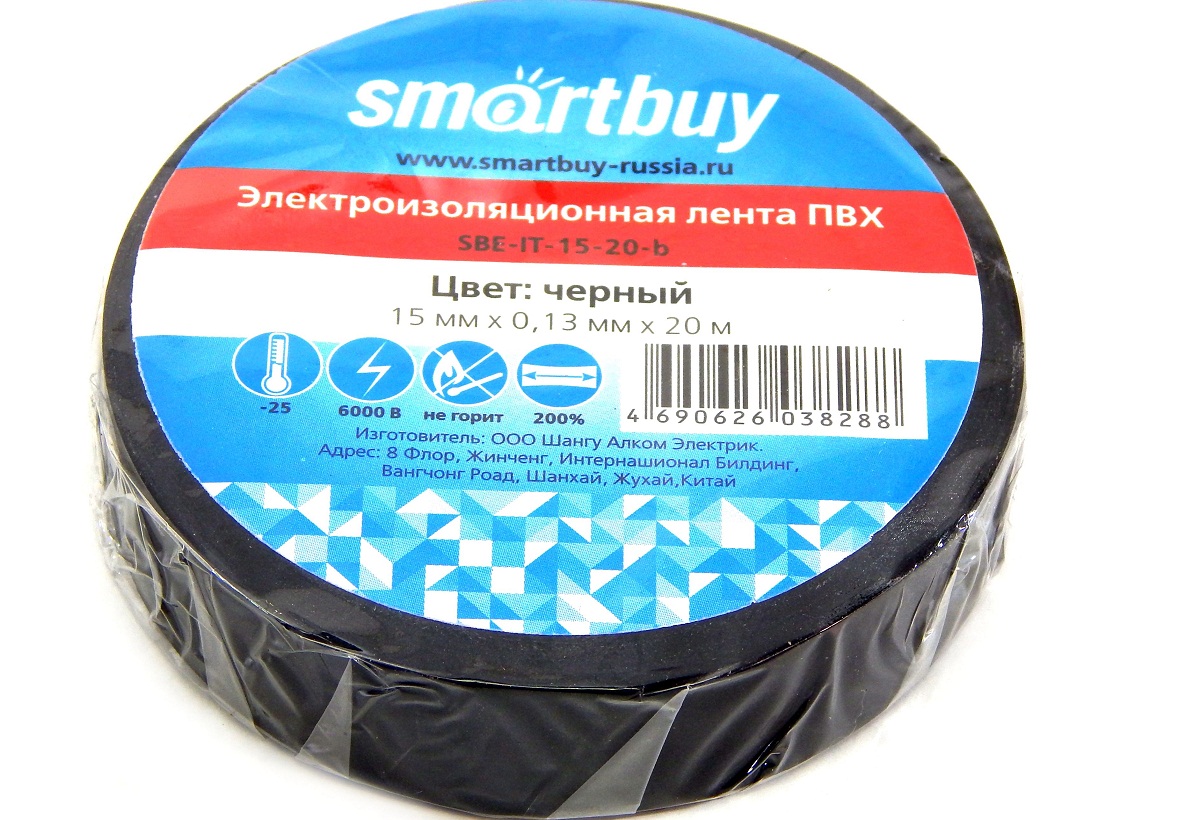
The black insulating tape has such performance characteristics as:
- High elasticity;
- Plastic;
- Moisture resistant;
- insulating qualities.
An elastic insulating tape made of polyvinyl chloride allows you to form a fairly strong and resistant to various mechanical stress harness. For this, several cables are used, and it is also possible to reliably isolate the place of a break in the electrical network.
Due to the high degree of plasticity and good thermal insulation properties of the material, it is possible to use it to restore damage to any tubular products.
She is very resistant to temperature conditions and high levels of humidity. To carry out work with materials resistant to low temperatures, an insulating tape made on a cotton basis is used. It is possible to insulate the cable with a completely new material, in particular, such as liquid electrical tape.
When to Use Fabric Tape
Fabric insulating tape is designed to perform insulation work in absolutely any room, except for rooms with a high level of humidity. It is based on polished polyester.
The main characteristics of such a material is that the fabric electrical tape is distinguished by such characteristics as:
- High resistance to mechanical damage;
- Temperature stability;
- High adhesion force;
- Does not contain harmful substances and solvents.
A similar material is widely used to insulate wiring in a car. European car manufacturers use it in their cars, as this material is characterized by quality, reliability and durability. This insulating tape is characterized by frost resistance, as well as a high degree of resistance to machine oils, as well as various kinds of solvents.
Black PVC tape (video)
Insulating tapes based on PVC and cotton materials have long been known to everyone and are used in a wide variety of fields. Thanks to a wide color range, it can be used not only for insulation, but also for marking various kinds of products.
PVC insulating tape 15mm white w/grade is a polyvinyl chloride film made from PVC composition. It is used in everyday life and in production as an insulating material for electrical work. The substances that make up the base of the electrical tape and the adhesive layer prevent the film from igniting and melting.
PVC insulating tape 15mm yellow is a polyvinyl chloride film made of PVC composition. It is used in everyday life and in production as an insulating material for electrical work. The substances that make up the base of the insulating tape and the adhesive layer prevent the film from igniting and melting.
PVC insulating tape 15mm green is a polyvinyl chloride film made of PVC composition. It is used in everyday life and in production as an insulating material for electrical work. The substances that make up the base of the insulating tape prevent the film from igniting and melting; combustion is possible only when exposed to an open flame.
PVC insulating tape 15mm red is a PVC film made of PVC composition. It is used in everyday life and in production as an insulating material for electrical work. The substances that make up the base of the insulating tape and the adhesive layer prevent the film from igniting and melting.
PVC insulating tape 15mm blue is a polyvinyl chloride film made of PVC composition. It is used in everyday life and in production as an insulating material for electrical work. The substances that make up the base of the insulating tape and the adhesive layer prevent the film from igniting and melting.
PVC insulating tape 15mm black is a polyvinyl chloride film made of PVC composition. It is used in everyday life and in production as an insulating material for electrical work. The substances that make up the base of the insulating tape and the adhesive layer prevent the film from igniting and melting.
PVC insulating tape AVIORA 15mm white is a polyvinyl chloride film made of PVC composition. It is used in everyday life and in production as an insulating material for electrical work. The substances that make up the base of the insulating tape and the adhesive layer prevent the film from igniting and melting.
PVC insulating tape AVIORA 15mm yellow is a polyvinyl chloride film made of PVC composition. It is used in everyday life and in production as an insulating material for electrical work. The substances that make up the base of the insulating tape and the adhesive layer prevent the film from igniting and melting.




